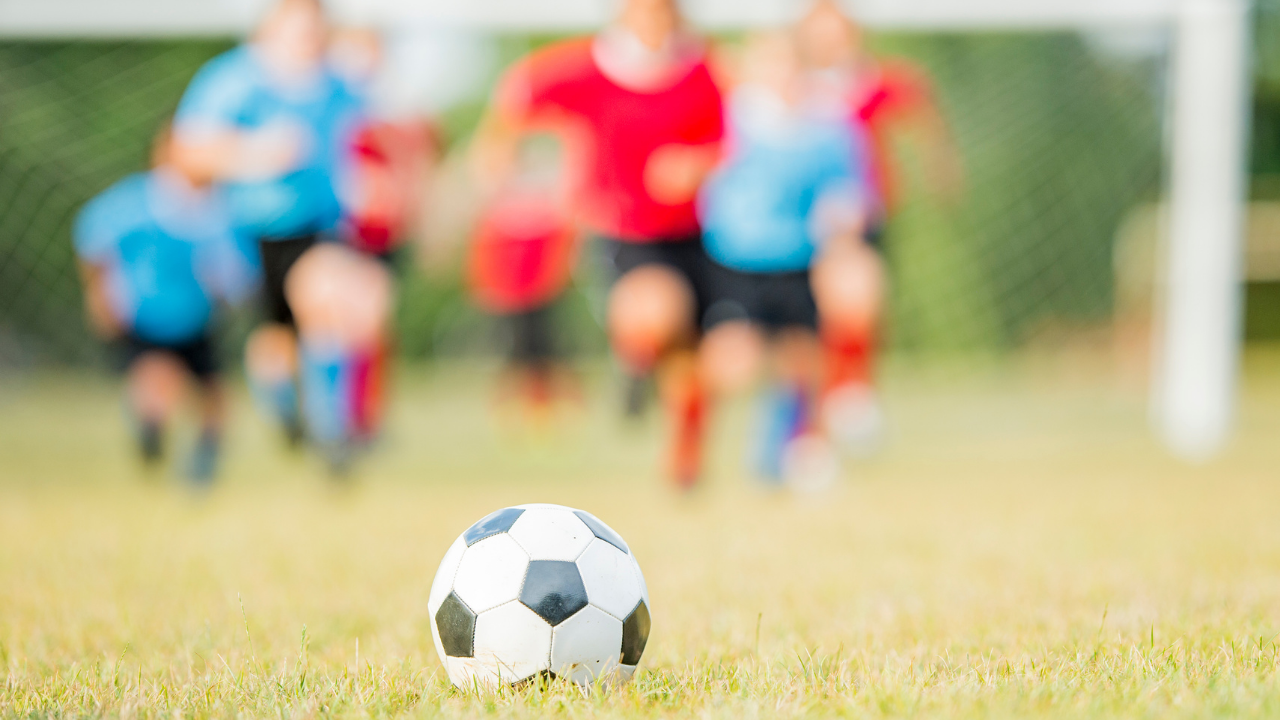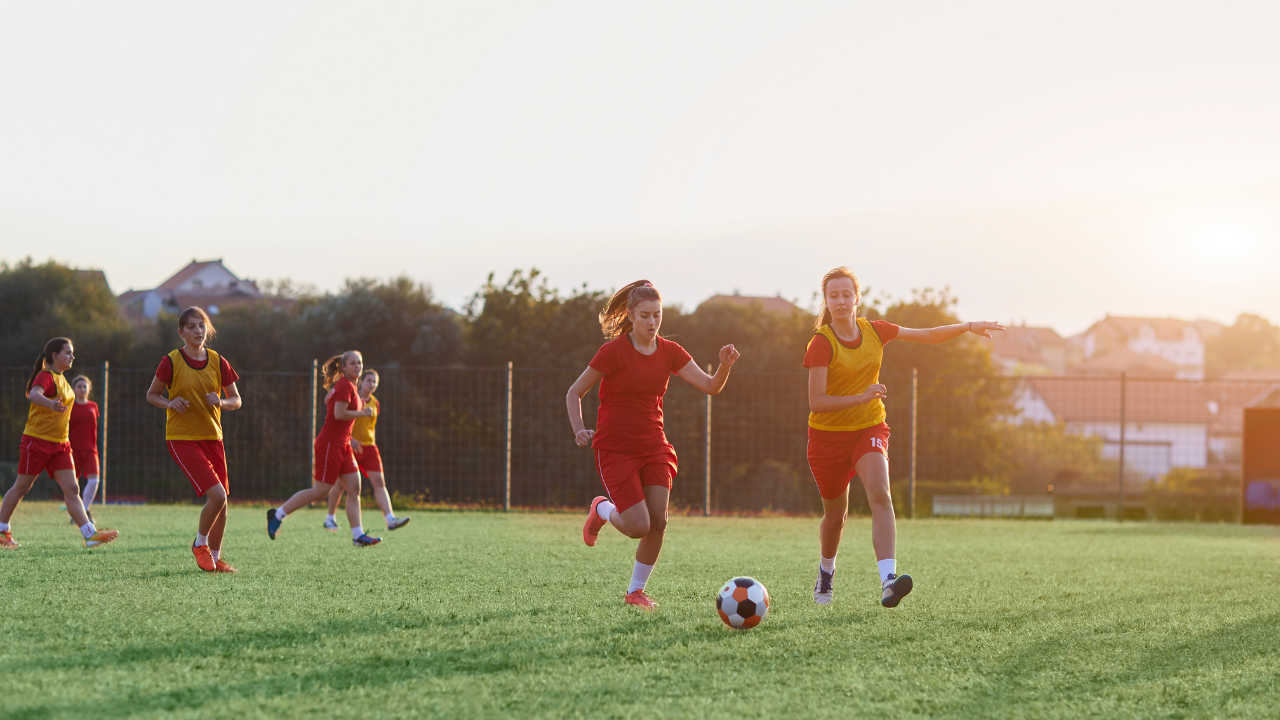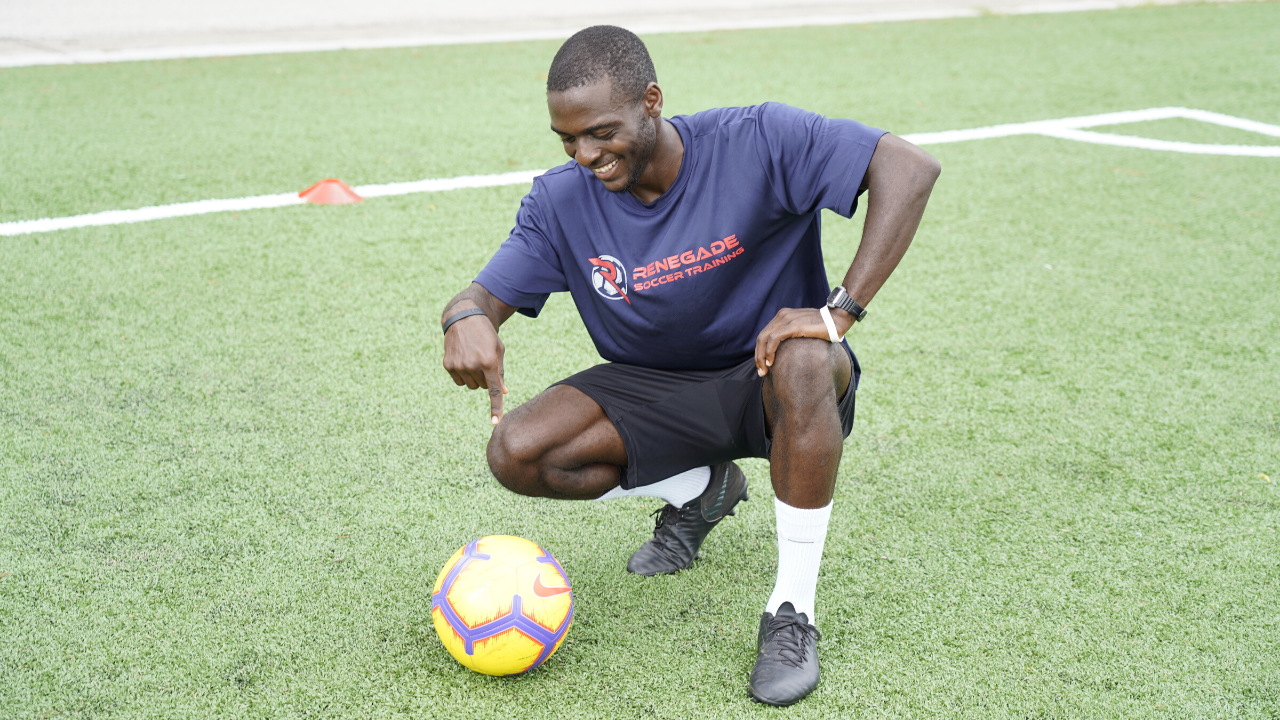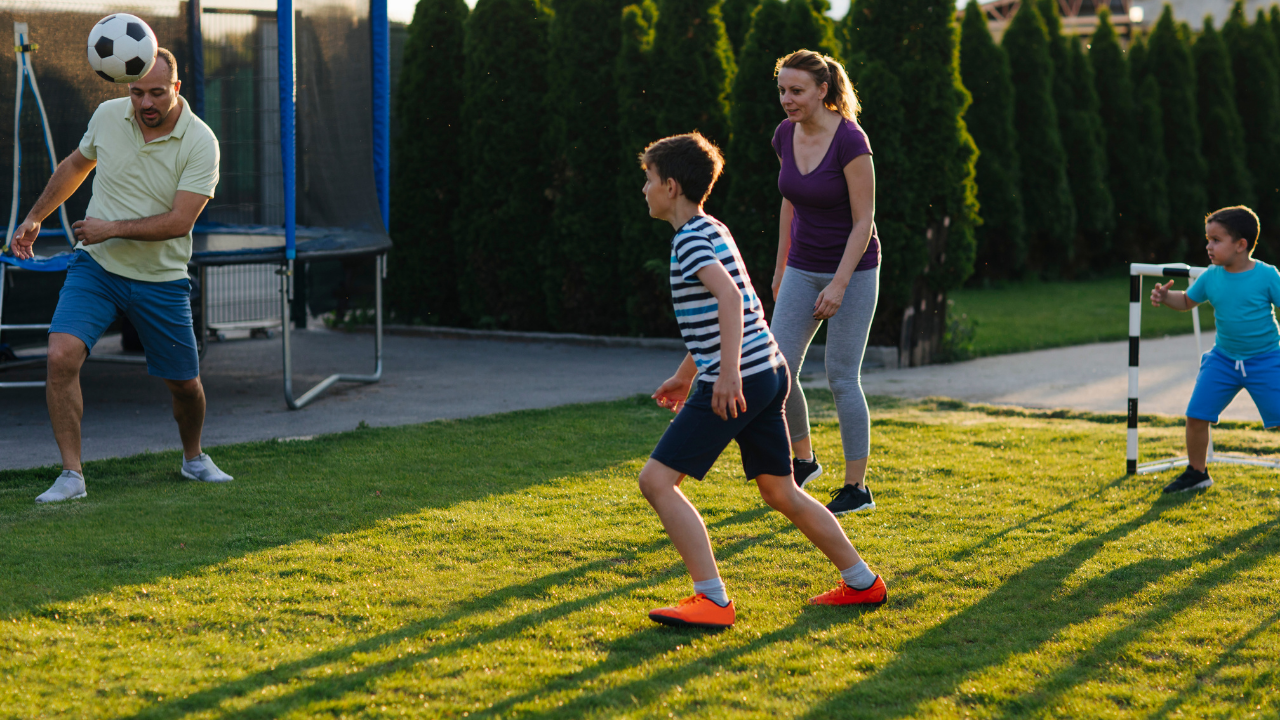Here at RST, we believe that everyone – especially your child, started playing this game because it was fun.
It was exciting. They enjoyed the game, made new friends, learned a few new skills, and stayed active and healthy.
Playing probably made them feel like a hero, and they reveled in how something they accomplished made a direct impact on the team. And then, maybe the feeling was so good that your child decided to go all in and make soccer their “thing.”
So you worked hard to get them the right opportunities, make sure they were on the right teams and had the right focus.
And then you blinked. And somehow, this positive force in your child’s life became an albatross. You feel like you went from #winningthisparentingthing straight to #parentfail without any warning.
The excellent news is….its, not you.
The bad news is that all too often, when you level up, it’s no longer about having fun, learning, and maybe winning a few games… it’s about winning at all costs.
The pressure to perform ramps up so quickly at the next level, and your child worries about… what others think about them…how to NOT mess up… where they “fit” in, etc.
This pressure point in your child’s development is where the “Other-Self” thrives and can bring down even the best athletes. But luckily for you, the Other-Self is essentially a coward, and learning the right tools to deal with it is within your grasp.
The “Other-Self” Is What Hurts Your Child’s Confidence In Soccer
The problem is the other-self.
See, the Other-Self is that little voice that sits on your shoulder and whispers your insecurities and self-doubts to you every chance it gets – you might know exactly what we mean here.
However, when it comes to your child’s confidence in soccer, “Other-Self” is directly related to the club system’s current culture and construct.
The Other-Self has space to grow because of the many opportunities there are in club soccer:
- High-pressure tournaments
- High-pressure competition level
- The higher expectation from coaches
- Higher expectations from parents
- High pressure from teammates
- A higher level of commitment of time
- Larger monetary outlay
- Etc…
Ideally, these demands produce better athletes. And for some, it works.
But…
- What if your child doesn’t see the progress that the others are?
- What if your child is late-developing?
- What if your child is having trouble with the other players? Or the Coach?
- What happens to your child internally?
See, the Other-Self is the voice inside you that feeds off of the small failures. Your Other-Self thinks it’s protecting you, but instead, it’s sowing the seeds of doubt, insecurity, depression, and so on.
Unfortunately, your Other-Self doesn’t understand that failure and risk are not always fun or painless, but they are essential for growth.
So many athletes experience this.
Why is this such a big problem for my child? Isn’t this something he should just get over?
Simply put…Our current club culture only acknowledges winning matches as evidence of success. Therefore… No Winning = No Success. Think about how much your Other-Self can torment you about a lost game, now consider how much worse it’ll be if you didn’t even get to play in that game? What if you make a mistake in the game? What if your Coach and teammates yell at you? All of these things are just fodder for your “Other-Self.”
Competitions should be positive; however, they simply feed the Other-Self if you aren’t identifying and defining other success measures and supporting a learning culture.
Why is the club soccer situation so bad?
Club soccer has morphed to include so many other variables, other than soccer, that impact our connection with the sport we love.
So instead of thinking about soccer as a game that your child played with her friends and knocked the ball around and love, and she wins some and loses some, she laughs and learns and…
Soccer becomes this massive thing that involves travel, pressure, winning, coaching, personal training, and us trying to figure out where we stand in the hierarchy, right? Because whether your child can articulate it or not, we all exist in the hierarchy, social and skill-wise.
To fight the Other-Self, to regain our confidence, to LOVE our game again, we need to take back control of our soccer development.
External Problems Created By Low Confidence
But first, what are the effects of the Other-Self as we spiral into this negative feedback loop?
Let’s put ourselves into our child’s perspective for a bit…
Externally, they first see their parents getting frustrated…
They’re wondering if it is because of their performance or maybe it’s because you think they’re not as motivated as you want them to be…
(your child will NEVER think that it’s because you’re frustrated with…the Coach, the reffing, the other players and their parents, the fact that you feel helpless in getting them to figure out this confidence thing, or the reality that it’s 7:00 am on a Saturday, and you’re on a field 2 hours from home, and you haven’t had any coffee yet 🙂
But really, your child is just unsure of themselves internally.
Then their teammates get frustrated at them, give a look, make a comment, etc.
Now throw in all of this focus on winning – which now means that they have to perform their best.
Maybe the coach is no longer confident in their ability on the field, so they see less playing time. Instead of being excited about Saturdays – where they’re going to go have some fun with their friends, traveling together, singing songs – bonding…
They’re feeling very, very nervous and they’re focused on the fact that they don’t want to let the team down.
So they begin to fear Saturdays, and all of the fun quickly becomes this painful event that takes on a completely different shape inside their head…
The Subtle Ways Low-Confidence May Appear In Your Child
Parents see the effects of the Other-Self in subtle ways. Like not getting the reaction they expect when they bring up soccer, training, or new opportunities. Maybe it’s lashing out or outbursts after a practice or a game. Or they are even choosing to do non-important things (e.g., video games, tik tok, watching Netflix, etc.) instead of soccer.
Maybe it’s a lack of motivation from your child. Maybe.
Or maybe it’s their way to avoid the pain.
It’s heartbreaking and frustrating for parents because, as a parent, you’re lost on how to communicate and what “the right” approach should be.
There’s no direction.
Who do you turn to? How do you help your child?
Because they love soccer and they would typically play pickup soccer for hours, but instead, they’re getting frustrated and turning inside themselves.
This behavior looks to you like burnout. You think maybe your child just doesn’t like soccer anymore, but it’s really just self-doubt. It’s the battle that they’re fighting internally against their Other-Self.
Low Confidence In Soccer: Tip of The Iceberg
Now internally, if you think those outward signs are ominous, they’re just the tip of the iceberg.
There is a humongous storm that’s brewing below the surface, and it’s all fueled by the Other-Self.
The player is stuck inside this negative feedback loop – amplified by the sense of pressure that comes from winning – applied by club soccer.
The reality is that your child may very well feel more desire to do well than the superstar on the team.
But all of that desire, all of that pressure comes from a negative place.
The game is more about “Let’s not let my other players down for the struggling player. Let’s not make mistakes.” Rather than, “I’m trying to go dominate on the field and have some fun with my friends.” It’s more, “Let’s not mess up.”
And when they do well, it ends up being more of a relief than a celebration.
So they actually never even experience the same feeling that the player who has a positive, confident mindset feels when they win…
In the end, even if their team won and they contributed to it, the takeaway is really just a sense of, “Wow, I’m glad I didn’t make a mistake.”
And in this dynamic, the entire framework of how they experience the game has changed, and it’s all now controlled by the Other-Self, and the spiral downward continues..
The Comparison Game… From Parents
For the parents, it’s no better because parents start comparing themselves to other parents.
They see their kids struggle, and they know the successes of other players, and they wonder, “What are other parents doing that I’m not? I wish my child listened to me! I wish I didn’t feel like I’m struggling, and I am fumbling through these conversations with my child. And why aren’t they motivated to play the game that they love anymore?
Worse, you feel bad because you don’t even know how to talk to your child about this issue. How do you bring it up without them blowing up on you or giving you useless one-word answers?
So guilt sets in as you see them struggle….
You question yourself and you fill yourself with doubt.
For you, the Other-Self is also being fed, and the trend is for you to try and do more. You end up focusing on the negatives that are happening instead of the good things that got your child into soccer in the first place.
Should Your Child Be Confident In Their Ability?
So, where did this all start?
How did this all happen?
The Two Types of Soccer Players & The Failed Club Soccer System
There are soccer players who are athletes and soccer players who just went out there to play. Both very, very different.
The idea was that if you paid for club soccer, your child would be training with other athletes who are doing all of the things that being an athlete involves – they’re already doing the work required to make progress every day.
Unfortunately, American Club Soccer pretended that it was the certifications or the fancier uniforms or the travel that was the differentiator. That’s what made club soccer better than rec soccer.
And it really wasn’t…
When club soccer started, the top 2% of soccer players were training outside or practicing, getting touches on the ball, and running at home. They would then show up to club soccer maybe twice a week, and yes, they would get a higher level of coaching because the coach didn’t have to focus on technical development. The athletes did that on their own through the nature of their passion.
On top of that, they were surrounded by other athletes who were doing all of this training at home, so their success was much higher.
But the clubs pretended like it was their club that made the athlete better. It wasn’t.
It was what those players were doing on the off days that made them great.
These kids were going to be good anyway because they had developed the traits of being athletes.
Now did the better coaching and being surrounded by other top players help? Of course it did!
It’s the icing on the cake. It’s the finishing school that teaches you how to take all of the technical and physical skills you’ve developed and how to apply them to the game that you love.
Building Your Child’s Confidence In Soccer With… A Piano?
So here’s an analogy…
You’re taking piano lessons twice a week. Still, you aren’t ever practicing your scales and arpeggios or the homework your piano instructor gives you between each of your piano lessons.
Your progress is going to be appropriately slow, right?
Even if you changed your own piano instructor, and this is where club soccer comes in, let’s assume you change your piano instructor to one who had this fancier background and all the certifications…
Let’s assume that you also got an upgrade and now have a fancier piano…
With all these upgrades in instructor and equipment… would this suddenly turn you into this fantastic piano player?
No, because the instructor is minimal, yes, very vital, but a tiny piece of the equation.
Now let’s go back to soccer…
Many of you have a great coach for your child, but unlike piano instructors, they aren’t giving you what you should be doing on the off days, right?
Why is it that piano players know exactly what they should be doing every single day?
Now It Starts To Make You Wonder About The Club System, Right?
Now if you take 16 to 18 other players, just like your child, and some practice on off days, or go get fancy private lessons or private personal trainers. They buy all the best gear and have the cool uniforms, and they travel around… What does this all amount to?
Are they suddenly going to be great because of the fancy uniforms and $300 cleats and a coach who went off to a few three days certifications?
We all know the answer to that.
We all know where that road leads.
So what is club soccer actually for? That’s a question we’re still trying to answer in the United States.
The foundation of great soccer is developing the traits of being an athlete instead of just being a player.
It’s simple. You get good at playing the piano in between your practices.
The same is right for soccer.
Club soccer was and still is for players who figured out what being an athlete means. And if you’re still figuring this out, then you’re struggling to keep up with those around you who have already figured it out.
These traits are the Delta in performance; this difference in the outcomes you’re seeing is feeding the Other-Self.
What Does RST Know About Building Confidence In Soccer?
Now, trust me, I’m familiar with this feeling. It hurts me deeply to see athletes who struggle with their Other-Self. For college, I chose to walk onto a top 10 program in the country. Objectively, if I had been developed enough to be there, I would have gotten a scholarship. But I was a late developer physically, so instead, I walked on and tried to catch up.
I fought with my Other-Self…Every. Single. Day.
Now, as an older athlete, I face the exact same thing. I’m trying to figure out some small way to stay on the field with younger players, and my Other-Self is back looking for opportunities to control me.
My daughter also finds herself here, as many, many players do.
My daughter, Makenzie, has found fantastic success in the classroom because we laid down the same aspects of being an athlete, except for being a student. She did her homework every single day, but does she get her touches in on the volleyball? That’s something that we haven’t instilled in her yet because she just is beginning her volleyball journey.
She has this identity of being a strong student, and it comes with all of the recognition and confidence that comes with it because every day, she does the work necessary to be a strong student.
But with sports, that’s different…
Like me, she’s a late developer. So she’s a little bit shorter than the other volleyball players. She doesn’t have quite as much muscle as the other girls. And more importantly, since we haven’t laid down this foundation yet, she wasn’t doing the necessary things to bring her skill level up and make up for her lack of size at this point in her development.
She doesn’t identify with the same things as she does in the classroom. In school, she is a strong student, a dedicated student. But she doesn’t quite say to herself, “I’m a volleyball athlete,” yet.
Now, who am I? I’m JR Haworth. I’m the creator of Renegade Soccer Training. I’ve coached multiple sports at multiple levels, from high school to college. I’ve coached Kodak All-Americans, all-region, all-conference players. And in my private businesses that I’ve started, I’ve had tens of thousands of client hours with athletes just like you.
I’ve always been known as more of a cerebral coach because I was kind of this jock nerd growing up. I was still interested in the science behind why things were happening. And I always dug down to figure things out, instead of just chalking it up to being bigger or faster or stronger. Even as a performance coach, I’ve always focused on the journey each athlete takes internally.
Because when changes manifest themselves internally, performance and confidence completely change externally.
So what are the few things that you can do today that will begin to quiet the Other-Self, build your confidence, and help you find your love of the game again?
Building Confidence With Your Child And Yourself
Building Habits
The first is to honestly take back control of your soccer development instead of handing it over to club soccer. So how are we going to do this? Number one, let’s build habits of being an athlete.
So my question is, what can you do today that will boost your confidence on the field? What area of your game needs a little bit of work? And what can you do, even for just 15 minutes, just prove to yourself that you love the game enough to give it 15 minutes of your time every single day?
And how do you know that you’re improving? So what we need to do is we need to set up a positive feedback loop.
Measures Your Success – Objectively
It’s likely your Other-Self is strong, maybe even in control, right now, and your negative feedback loop has zapped your confidence. We need to give you tons and tons of data points that will objectively reinforce to you that you’re improving.
So measure yourself today at whatever skill you’re trying to improve. And then maybe a month from now, six weeks, eight weeks from now, measure yourself again and continually do that, reflect on it. Try and find moments at practice where you’re seeing success using these your 15 minutes a day skills and write about it in a journal.
Creating The Right Environment
Now for parents, parents need to know how to reset the environment. So that way, your child feels completely safe and supported as they move through this growth process.
All of us would like to pretend that growth is this easy process, but it is not. That’s not what learning and development are. Learning and growth come from setbacks. They come from not being successful or little mini failures, and our ability to overcome is essential.
Our job as parents is to set up this unwavering supportive environment that will allow them to have the courage to be really bad at the thing they love.
And that is entirely okay. If your child is passionate about it and wants to practice at it and get really good, they have to develop the courage not to be very good. They need the courage to have setbacks and failures. And they need to know your love of them; your support never waivers, not even for a second because you’re supporting the process of growth and not just the outcomes.
Celebrate The Actions & The Outcomes
And finally, we need to learn as an entire family, both the parents and the athletes, to celebrate the process. We need to celebrate the actions and our dedication to staying the course. One thing that helps is to focus on the process and celebrate the efforts and the commitment to the process.
For example, let’s say your child has a goal of training six days a week for 15 minutes each day. When they do that, you need to celebrate that like you celebrate for the game-winning score.
Think for a minute about how much you/others cheer for your favorite team on TV.
That team means relatively nothing when we compare it to the importance of our children. And so if we’re standing up and we’re cheering, and we’re high fiving, and we’ve bought uniforms for a bunch of professional athletes who are on television, we better be doing that with our children.
We better be high-fiving them and hugging them, and having the same level of joy and energy supporting them when they find their successes.
So learning to celebrate the process is hugely important.
Take Action Today & Start Building Confidence Right… Now!
Here at RST, we’re all about taking action… and we know that one of two things will happen to those who read this article…
- Some will love it (Thank you, virtual high-five!)
- Some will hate it (All good, please find another resource that resonates more with you)
And between the two, 99% of the people that read, will no do anything.
Only 1% will take action and implement.
In true Renegade fashion, we want, we hope – you’re in that 1%.
We have a saying here that “Only Renegades Become Legends,” meaning, going against the grain is honorable.
If you’ve read to this point and perhaps had an “ah-ha” moment, we hope that you act on it and implement it without your own team – your family team – so that regardless if your child plays soccer or not, they’ll have the right foundation, tools and support to make sure they play and feel confident.
And so will you… as the parent, you’re doing your best and you can’t fault yourself for not knowing what you don’t know. We all want the same thing – the best thing for your child – so they can go out and have fun.
But for the 99% that are out there that take no action, regardless if you take our advice or not, be mindful of the affects that could have on your child. The stakes are high and sure, pressure makes diamonds, but it can also crush people.
So we hope that you’ll be your own Renegade and go against the grain, go against what the other 99% of people who read this article will do, and become the 1% that takes action.
You, your child, and your family are worth is.
Your biggest fan
– Coach JR







